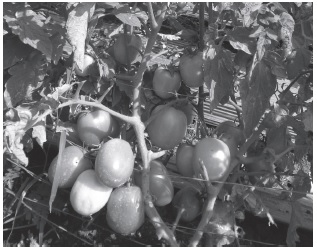Production of “chonto” tomato lines, Solanum lycopersicum Mill., with expression of the sp gene responsible of determinate growth

Abstract
Introgression of the recessive sp gene, responsible of determinate growth, was carried out from IPA 4 Brazilian tomato to UNAPAL-Maravilla Colombian “chonto” tomato to modify the architecture of the plant and contribute to the reduction of production costs. In the F2 generation of the fourth backcrossing, the selection of plants with a height of less than 150 cm, a fruit weight of more than 90 g and an oblate fruit shape was carried out. After the selection process, six lines of tomato “chonto” with a determinate growth habit and characteristics of this type of tomato were evaluated. The D5 and D6 lines with determinate growth were selected, with a plant height of 109.30 and 114.40 cm, harvest days of 87.75 and 87.25, and yield per plant of 4,116.6 and 4,029.7 g, respectively.
Keywords
Plant breeding, Introgression, Backcross, Segregation, Selection
References
- Baena, D.G., F.A. Vallejo y E.I.E. Salazar. 2003. Avance generacional y selección de líneas promisorias de tomate (Lycopersicon esculentum Mill) tipos chonto y milano. Acta Agron. 52(1), 1-9.
- Carmel-Goren, L., Y.S. Liu, E. Lifschitz y D. Zamir. 2003. The SELF-PRUNING gene family in tomato. Plant Mol. Biol. 52(6), 1215-1222. Doi: 10.1023/B:PLAN.0000004333.96451.11
- Carvalho, J.O., J.M. Luz, F.C. Juliatti, L.C. Melo, R.E. Teodoro y L.M. Lima. 2003. Desempenho de famílias e híbridos comerciais de tomateiro para processamento industrial com irrigação por gotejamento. Hortic. Bras. 21(3), 525-533. Doi: 10.1590/S0102-05362003000300023
- FAOSTAT. 2014. Production. Crops data. Em: Em: http://www.fao.org/faostat/es/#data/QC.; consulta: marzo de 2017.
- Filgueira, F.A.R. 1982. Manual de olericultura. Ed. Agronômica Ceres, São Paulo, Brasil.
- Fridman, E., Y. Liu, L. Carmel-Goren, A. Gur, M. Shoresh, T. Pleban y D. Zamir. 2002. Two tightly linked QTLs modify tomato sugar content via different physiological pathways. Mol. Genet. Genom. 266(5), 821-826. Doi: 10.1007/s00438-001-0599-4
- Krieger, U., Z.B. Lippman y D. Zamir. 2010. The flowering gene SINGLE FLOWER TRUSS drives heterosis for yield in tomato. Nat. Genet. 42(5), 459-463. Doi: 10.1038/ng.550
- Ledo, F.J.D.S., J.P. De Campos, P.C.R. Fontes, J.A. Gomes y F.P. Reis. 1994. Comportamento de seis cultivares de tomate de crescimento determinado, sob três sistemas de condução da planta, na produção de frutos para consumo in natura. Ceres 42(240), 218-224.
- Moya, C., M. Álvarez, D. Plana, M. Florido y C.J.B. Lawrence. 2005. Evaluación y selección de nuevas líneas de tomate (Lycopersicon esculentum Mill.) con altos rendimientos y frutos de alta calidad. Cultivos Tropicales 26(3), 39-43.
- Nuez, V. F. 1995. El Cultivo del tomate. Mundi-Prensa. Madrid, España.
- Pardey, C. 2008. Caracterización y evaluación de accesiones de Capsicum del Banco de germoplasma de la Universidad Nacional de Colombia sede Palmira y determinación del modo de herencia de la resistencia a potyvirus (Pepdmv). Tesis de doctorado. Facultad de Ciencias Agropecuarias, Universidad Nacional de Colombia, Palmira, Colombia.
- Piotto, F.A. y L.E.P. Peres. 2012. Base genética do hábito de crescimento e florescimento em tomateiro e sua importância na agricultura. Ciênc. Rural 42(11), 1941- 1946. Doi: 10.1590/S0103-84782012001100006
- Pnueli, L., L. Carmel-Goren, D. Hareven, T. Gutfinger, J. Alvarez, M. Ganal y E. Lifschitz. 1998. The SELF-PRUNING gene of tomato regulates vegetative to reproductive switching of sympodial meristems and is the ortholog of CEN and TFL1. Development 125(11), 1979-1989.
- Santiago, J., M. Mendoza y F. Borrego. 1998. Evaluación de tomate (Lycopersicon esculentum, Mill) en invernadero: criterios fenológicos y fisiológicos. Agron. Mesoamer. 9, 59-65.
- Vallejo, F.A. 1999. Mejoramiento genético y producción de tomate en Colombia. Universidad Nacional de Colombia, Palmira, Colombia.
- Vallejo, F.A., M.M. Espitia, E.I. Estrada y H. Ramírez. 2010. Genética vegetal. Universidad Nacional de Colombia, Palmira, Colombia.
- Vallejo, F.A. y E.I. Estrada. 2002. Mejoramiento genético de plantas. Universidad Nacional de Colombia, Palmira, Colombia.
- Vallejo, F. A. y E.I. Estrada. 2004. Producción de hortalizas de clima cálido. Universidad Nacional de Colombia, Palmira, Colombia.
- Vallejo, F. A. , Messa, R.M. y M.E. Villafañe. 1994. Variabilidad genética y ambiental entre líneas de tomate “chonto”, Lycopersicon esculentum Mill., sin utilizar pruebas de progenie. Acta Agron. 44(1-4), 75-84.
- Yelle, S., R.T. Chetelat, M. Dorais, J.W. DeVerna y A.B. Bennett. 1991. Sink metabolism in tomato fruit IV. Genetic and biochemical analysis of sucrose accumulation. Plant Physiol. 95(4), 1026-1035. Doi: 10.1104/pp.95.4.1026
